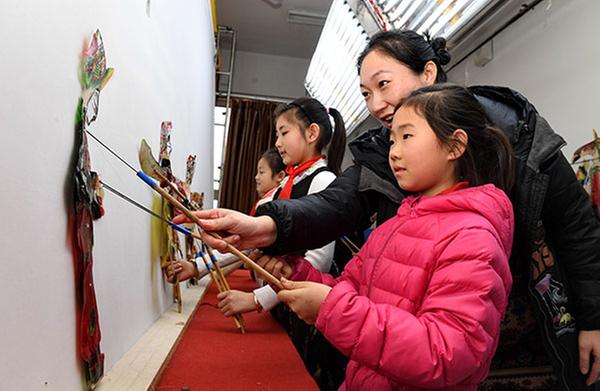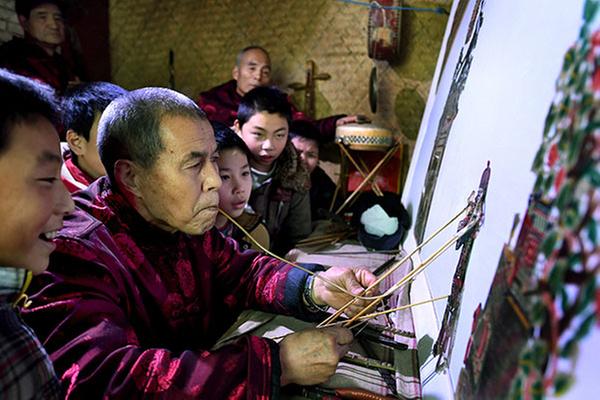Shadow puppetry returns to spotlight
By Xinhua | China Daily | Updated: 2017-04-27 07:02
|
Students practice shadow puppetry under the guidance of their teacher at Zhongshan Experimental School in Luanxian, Hebei province.Mu Yu / Xinhua |
However, learning is difficult and it can take years before puppeteers are ready to go on stage.
"Every movement has to be on point," Wang said. "You need to memorize the whole script, and sing the lines of many different characters, while showing their emotions with the puppet strings."
Shadow plays went through a hiatus during the "cultural revolution" (1966-76), but reemerged in the early 1980s, when the art was involved in rural marriage ceremonies, funerals and banquets.
However, since China's reform and opening-up began in the 1980s, a large number of rural residents have moved to cities for employment, while domestic appliances like TV sets and radios have become common. The ancient art began to lose younger audiences and had to compete with modern entertainment.
Passion for puppetry
Wang gave up puppetry in 1991 and went to the southern metropolis of Shenzhen in Guangdong province to work on a pig farm. He soon made lots of money, but maintained his passion for puppet plays.
"I told myself that I could not let the art slip through my hands," Wang said.
In 2000, he went back to Sichuan and, with the help of a friend, put on a show in Chengdu, the provincial capital. The performance was a huge success and generated significant media attention.
Four years later, Wang went back to his hometown and started a shadow play troupe.
Meanwhile, he continued to look for people willing to learn the art.
In 2007, he recruited 22 students. He broke the tradition of imparting the skill only to male students, by recruiting both males and females, giving each of them 600 yuan ($85) in subsidies every month.
But his efforts were to no avail. Most of the students looked at learning the art as a temporary job and gradually left.
The last student to leave Wang's troupe was his favorite - the student told his teacher that he was going to join the army.
"I gave him 1,000 yuan and bought him some fruit before sending him on his way," Wang said. "After that, I closed all the doors and cried."
Wang then locked himself in his room for the entire day, believing his craft was dying out for good.
He later told his story to an official from the Ministry of Culture, who complimented him for "doing a worthy thing".
"Related laws and regulations protecting the art are still under discussion," the official told Wang.
In June 2011, China issued a law protecting intangible cultural heritage. In the same year, shadow puppetry was added to a UNESCO List of Intangible Cultural Heritage.
"Since then, I have felt like I am no longer alone in protecting cultural heritage," Wang said.
In the past few years, the upper limit of funding Wang can apply for has risen from 300,000 yuan to 1.5 million yuan per year, and he also receives 20,000 yuan in subsidies each year from the government.
A 4,200-square-meter museum of shadow puppetry is now under construction on a main street in his hometown, which will display the 50,000 puppets Wang owns.
Wang hopes to train more talent and create more shadow-performance programs.
"I'm just glad that shadow plays are crawling out of the shadows in the modern era," he said.
|
A puppeteer demonstrates his skills to children at Huazhou Shadow Puppet Culture Hall.Tao Ming / Xinhua |


























